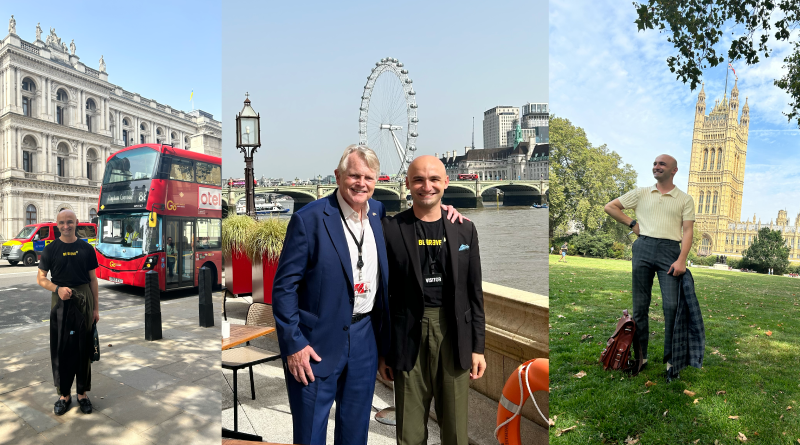Presentations in London on Rethinking Disinformation
By Zviad Adzinbaia, Ph.D. Candidate, International Security and Digital Diplomacy Fellow, The Fletcher School
My recent research trip to London from September 4 through 10, 2023, offered a valuable opportunity to exchange insights on disinformation with British government officials, nonprofit organizations, and global technology companies based in London.
Building on my recent work under the advisement of Professor Chris Miller, I engaged in a comprehensive dialogue with the UK Cabinet Office titled “The Menu for a Smart Battle on Disinformation.” This day-long series of presentations and discussions focused on the development of information defense and management systems, emphasizing proactive measures to deal with existing and evolving regional and global information landscapes.
The Forward Information System, a concept I have developed, advocates for a shift from resilience-oriented policies to a forward-thinking approach. The FIS prompts organizations and institutions to go beyond merely recovering from information assaults and disturbances; it advocates for strategic transformation. This is a departure from conventional resilience tactics, which typically concentrate on restoring stability and maintaining the status quo after attacks.
During my visit to London, I had the opportunity to engage with senior representatives from the UK’s Ofcom and Google’s London branch, which directs the company’s efforts across European and Eurasian markets in combating information manipulation. We delved into lively discussions, governed by the Chatham House Rule, to evaluate how the Forward Information System aligns with current or forthcoming projects and to exchange insights on their cutting-edge content moderation, regulation, and digital literacy initiatives.
I am heartened by the exemplary, enduring, and sophisticated efforts of my British counterparts in all sectors. Looking ahead, I aspire to see the Forward Information System adopted in European nations allied with the United States, particularly where malign external meddling and exploitation are rampant, notably in light of Russia’s ongoing war against Ukraine. Among these nations is Georgia, my homeland, which is anticipating pivotal elections in October 2024.
The Menu is designed to offer comprehensive diagnostic evaluations of a system’s existing condition, analyzing its architecture, strategic approach, track record, and readiness to foresee and address potential threats and other adversarial efforts. This involves fostering improvements and pioneering innovations that can outmaneuver adversaries. It integrates technology with a human touch, focusing on human-driven and human-centered solutions across short-, medium-, and long-term horizons. Key features of the Menu include components such as rapid alerts, forecasting, social listening, and information immunity building.
In an era where diplomacy extends beyond state entities, digital diplomacy becomes vital for maintaining robust information integrity systems and engaging international allies. Reflecting on Professor Joseph Nye’s concept of power diffusion, it is clear that no individual or organization can single-handedly address the threats and challenges posed by information warfare. We are all in it.
This project is a crucial part of my doctoral work within The Fletcher School’s International Security Studies Program. As my work progresses, I remain thankful for the sustained backing from the Fletcher Russia and Eurasia Program.

